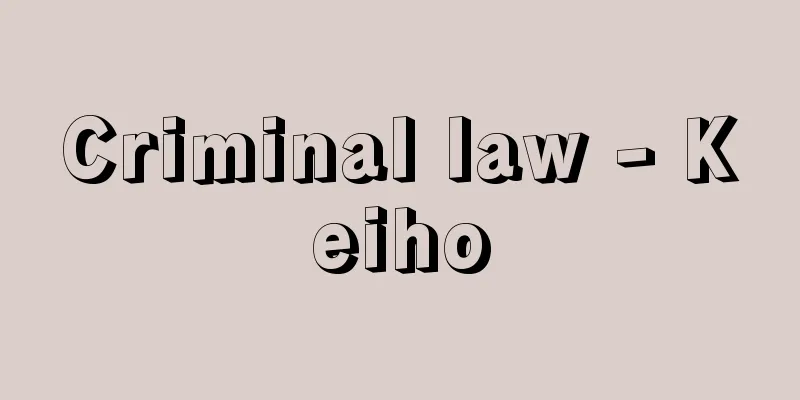Criminal law - Keiho

|
It refers to laws that stipulate penalties and crimes that are acts that should be punished. In the narrow sense, it is the "Penal Code" (Law No. 45 of 1907), i.e. the Penal Code, but in the broad sense, it is a general term for all legal norms that result in penalties when violated. Special laws of the Penal Code, such as the "Minor Offenses Act" and the "Explosives Control Penalties Act," as well as the "Road Traffic Act," "Firearms and Swords Possession Control Act," and "Explosives Control Act," which are originally in the field of administrative law, are also included in the broad sense of the penal code in terms of their penalties (provisions that stipulate that penalties be imposed for specific acts within the law) (the former are sometimes called special penal laws and the latter administrative penal laws). In modern states, criminal punishment is limited to public punishments that are carried out only by the state, so criminal law belongs to so-called public law, which regulates relations between the state and individuals, and is distinguished from private law (civil code, commercial code, etc.), which regulates relations between individuals. [Haruo Nishihara] Source of LawIn principle, criminal law must take the form of a law in the narrow sense, that is, a law enacted through a resolution of the Diet. This is a consequence of the principle of criminal legality, a fundamental principle in modern criminal law, namely, "there is no crime without law, and no punishment without law," and is also recognized in Article 31 of the Constitution of Japan. However, there are two exceptions to this. The first is when penal provisions are established in government ordinances by delegation of law, which is recognized as an interpretation of Article 73, paragraph 6 of the Constitution. The second is when penal provisions are established in ordinances of ordinary local public entities (prefectures, cities, towns, and villages), which is stipulated in Article 14, paragraph 3 of the Local Autonomy Act. Apart from these two exceptions, nothing other than a law in the narrow sense can become criminal law. Therefore, customary law cannot be a direct source of criminal law. [Haruo Nishihara] HistoryIn ancient times, Japanese criminal law was very simple and had a religious, curse-like character, but eventually, during the Imperial Dynasty period, it was strongly influenced by Chinese law, and the so-called Ritsuryo period based on codified law emerged. The Taiho Code (701) and the Yoro Code (718) are famous criminal codes from this period. However, in the later Imperial Dynasty, privately owned land gradually increased, and the manor system was eventually formed. As a result, the Ritsuryo system, which was based on national land ownership, collapsed, and Japan moved into the so-called Agency Period, where precedents from the Kebiishi Agency and customary law were the mainstream. Later, in the samurai era, when the centralized power of the shogunate was strong, there were centralized laws that were in effect nationwide, and some of these were codified customary laws of the samurai at that time. Examples of these are the Goseibai Code (Joei Code, 1232) in the Kamakura period and the Kujikata Osadamedegaki (1742) in the Edo period. However, in the middle of the samurai era, centered on the Sengoku period, each daimyo's territory saw its own unique development. Needless to say, the content of the samurai era's criminal laws was feudal law based on the class system, and the punishments were severe and military in nature. This character of the criminal code continued until the collapse of the Edo shogunate and the Meiji Restoration. After the Meiji Restoration, Japan's criminal law was modernized under the influence of Western law for the first time, and contributed greatly to the development of the national organization. The Western criminal law that Japan inherited originally started out in the form of two major legal systems, Roman law and Germanic law, but in the Middle Ages, it was modified by church law and local customary law and developed locally, and in the early modern period, centralized criminal laws were enacted for each nation-state. The model for many modern criminal laws is the French Criminal Code of 1810, which was based on the tradition of Roman law while reflecting the modern spirit expressed by the French Revolution. For a while after the Meiji Restoration, Japan applied old-fashioned criminal codes based mainly on the old ritsuryo codes, such as the Provisional Criminal Code, the New Code of Laws, and the Revised Ritsuryo Code. However, in order to avoid colonization, which has been an issue since the end of the Edo period, and to eliminate the unequal treaties that were in place to achieve this, and especially to eliminate consular jurisdiction, it was absolutely necessary to introduce a modern Western legal system. So in 1873 (Meiji 6), the government invited Professor Boissonade of the University of Paris to translate and revise the draft penal code that he had prepared, and distributed it in 1880. This became known as the "Old Penal Code." The old Criminal Code was Japan's first modern criminal code, fully influenced by Western legal systems, especially French criminal code, but some parts did not suit the actual conditions in Japan, so much so that discussions of revision arose within the Ministry of Justice as early as the year it came into force. The government continued deliberations to revise the Criminal Code, but in the process, the government's preference to refer to German law rather than French law became stronger. This was because not only had Prussia, a powerful country within Germany, won against France in the Franco-Prussian War (Prussian-French War) in 1871, but also because the political form of the German Empire, which had been established that same year, was thought to be more suitable for Japan at the time. This tendency was solidified at once when the Constitution (Constitution of the Empire of Japan, 1889), the fundamental law of the country, was modelled on German law, and a draft of the Criminal Code, which was heavily influenced by the German Criminal Code of 1871 but which drastically revised the provisions of the old Criminal Code, passed the Diet in 1907 (Meiji 40), was promulgated on April 24 of the same year as Law No. 45, and came into effect on October 1 of the following year, 1908. This is the "Criminal Code" which remains in force to this day. [Haruo Nishihara] Revision of the Criminal CodeNot only has the current Criminal Code been in existence for over 100 years, but in that time there have been remarkable changes in social life, changes in the nature of crime, shifts in thought, and advances in global crime prevention measures. Therefore, not all provisions remain as they were when the code was enacted, but it has been partially revised many times. It has been revised 31 times between 1921 (Taisho 10) and 2017 (Heisei 29). In 2017, the first major revision in 110 years was made, imposing harsher penalties on sexual crimes. In addition, there have been two attempts to completely revise the Criminal Code, both before and after World War II. First, the prewar comprehensive revision project was started in 1921 in response to the changes in the domestic and international situations after World War I, but it was unavoidably suspended in 1940 (Showa 15) when Japan entered a wartime system. The result of this project was the draft "Provisional Draft of Revised Penal Code" (1940). After the Second World War, the project for a comprehensive revision of the Penal Code was resumed in 1956. The project was progressing relatively smoothly until the announcement of the "Preliminary Draft of the Revised Penal Code" in 1961, which was a kind of preliminary draft. However, in the mid-1960s, Japan's postwar high economic growth had reached a certain stage, and the distortions of the code had expanded and become apparent without being resolved. As a result, the conflict between worldviews and national views became severe, and in particular, fierce debates were waged over the division between the exercise of state power and the protection of people's rights. This resulted in the emergence of radical street actions such as the university conflicts and the Zenkyoto movement, which reached a peak in 1969. As the project for a comprehensive revision of the Penal Code was carried out against such a turbulent background, extremely fierce criticism was unfolded against the underlying penal law theory and many individual proposed provisions, not only from within the council that deliberated on the matter, but also from outside. As a result, the project for a comprehensive revision was stalled, and the result of the deliberations, the "Draft of the Revised Penal Code," was announced in 1974, but it was left incomplete. However, there was no disagreement that it was inappropriate for the current Criminal Code, which was enacted as long ago as 1907, to be written in katakana and literary style, and to contain many outdated terms that are no longer used in everyday life today. Therefore, the government submitted a bill to the Diet in 1995 (Heisei 7) that, while making "simplification of expression (colloquial and modern language)" its basic policy, also deleted provisions that had been ruled unconstitutional by the Supreme Court (for example, the murder of an ascendant), and this was enacted on April 28 of the same year. This is the current form of the 1907 Criminal Code. [Haruo Nishihara] efficacyThe effects of criminal law are divided into three types: those related to time, those related to place, and those related to people. First, criminal law is effective from the time of its enactment until its repeal. However, when the law at the time of the crime (the time of the act) is different from the law at the time of the trial, the question arises as to which law should be applied. In cases where an act that was not a crime according to the law at the time of the act is deemed a crime by the law at the time of the trial, Article 39 of the Constitution provides that the law at the time of the trial does not extend back to the time of the act. This is exactly the requirement of the principle of criminal legality, which is a major principle in modern criminal law. On the other hand, when an act that was a crime according to the law at the time of the act is no longer a crime according to the law at the time of the trial, Article 337, paragraph 2 of the Code of Criminal Procedure requires that a verdict of acquittal must be given. Furthermore, in cases where an act is deemed a crime by both the law at the time of the act and the law at the time of the trial, but the severity of the punishment is different, Article 6 of the Criminal Code provides that the lighter punishment should be applied. Secondly, the Japanese Criminal Code applies to anyone who commits a crime in Japan. This also applies to crimes committed on board Japanese ships and aircraft (Article 1 of the Penal Code). However, there are some exceptions to this principle. Firstly, for certain crimes such as civil war and counterfeiting of currency that would seriously harm Japan's interests even if committed overseas, the Japanese Criminal Code applies even if they are committed overseas or by foreigners (Article 2 of the Penal Code). In addition, for certain relatively serious crimes such as arson, forced sexual intercourse, murder, assault and theft, the Japanese Criminal Code applies even if they are committed overseas, as long as they are committed by Japanese nationals (Article 3 of the Penal Code). Conversely, the Japanese Criminal Code now also applies to foreigners who commit certain crimes overseas, such as forced sexual intercourse, murder, injury and robbery against Japanese nationals (Article 3-2 of the Penal Code). Furthermore, for certain crimes committed by public officials, such as abuse of authority and bribery, the Japanese Criminal Code applies even if they are committed overseas, as long as they are committed by Japanese public officials. The Japanese Criminal Code also applies to all people who commit crimes overseas that are stipulated in the Japanese Criminal Code as punishable by treaty even if they are committed overseas (Article 4-2 of the Penal Code). Finally, in principle, Japan's criminal law applies to anyone, regardless of whether they are Japanese or foreign, as long as it is in force at any time and place. However, the Emperor is exempt from the application of the criminal law because of his constitutional status, and Diet members are not held criminally responsible for speeches, debates, or votes made in the Diet (Article 51 of the Constitution). Furthermore, in terms of international law, the criminal law does not apply to foreign sovereigns, presidents, their families, and their attendants who are not Japanese nationals, trusted foreign diplomatic officials (ambassadors, ministers), their attendants (counsellors, secretaries, assistant diplomats, military attachés to legations, and secretaries), their families, and their employees and attendants who are not Japanese nationals, and foreign military forces or warships within Japanese territory with authorization, as long as their status remains in effect. [Haruo Nishihara] "Learn Criminal Law" edited by Naito Ken and Nishihara Haruo (1973, Yuhikaku)" ▽ "Outline of Criminal Law: General Theory" revised edition by Danto Shigemitsu (1979, Sobunsha)" ▽ "Criminal Law, 3rd Edition by Ono Seiichiro, Nakano Tsugio, Uematsu Tadashi, and Date Akio (1980, Yuhikaku)" ▽ "Criminal Law General Theory" by Horiuchi Shozo (2000, Yuhikaku)" [Reference items] | | | | | | | | | | |Source: Shogakukan Encyclopedia Nipponica About Encyclopedia Nipponica Information | Legend |
|
刑罰と、刑罰を科せられるべき行為である犯罪を規定した法律をいう。狭い意味では「刑法」(明治40年法律第45号)、すなわち刑法典をさすが、広い意味では、違反した場合に刑罰を科せられる法律上の規範のすべてを総称したものである。刑法の特別法である「軽犯罪法」「爆発物取締罰則」などや、本来は行政法の分野に属する「道路交通法」「銃砲刀剣類所持等取締法」「火薬類取締法」なども、その罰則(その法律のなかの特定行為について刑罰を科すことを定めた規定)の部分については広い意味の刑法に含まれる(前者を特別刑法、後者を行政刑法とよぶ場合がある)。 刑罰は、近代国家においては国家の手によってだけ執行される公刑罰に限定されているから、刑法は国家と個人との間を規律するいわゆる公法に属し、個人と個人の間を規律する私法(民法、商法など)とは区別される。 [西原春夫] 法源刑法は、原則として、狭い意味での法律、すなわち国会の議決を経て制定された法律の形式をとらなければならない。これは近代刑法学上の大原則である罪刑法定主義、すなわち「法律なければ犯罪なく、法律なければ刑罰なし」とする原則からする帰結であって、日本国憲法第31条もこれを認めている。しかし、これには二つの例外がある。その第一は、法律の委任により政令に罰則が設けられる場合であって、憲法第73条6号の解釈として認められている。その第二は、普通地方公共団体(都道府県、市町村)の条例に罰則が設けられる場合であって、地方自治法第14条3項がこれを定めている。この二つの例外を除けば、狭い意味の法律以外のものが刑法となることはない。したがって、慣習法が直接刑法の法源となることはない。 [西原春夫] 沿革日本の刑法は、古代においてはきわめて素朴でかつ宗教的呪詛(じゅそ)的な性格をもっていたが、やがて王朝時代に至って中国法の影響を強く受けることとなり、成文法を基礎としたいわゆる律令(りつりょう)時代を現出することとなった。大宝律(たいほうりつ)(701)、養老律(ようろうりつ)(718)などがこの時代の刑法として有名である。しかし王朝後期になってしだいに私有田が増加し、やがて荘園(しょうえん)の制度が形成されるようになると、土地国有制のうえに立脚していた律令制度は崩壊し、検非違使(けびいし)庁の判例や慣習法を主流とするいわゆる庁例時代に移行することとなった。 下って、武家時代の刑法は、幕府の中央集権的権力が強かった初期および後期には、全国に効力を有する中央集権的な法律も存在し、そのなかには当時の武家の慣習法を成文化したものも見受けられた。鎌倉時代における御成敗式目(貞永式目(じょうえいしきもく)、1232)や、江戸時代における公事方御定書(くじかたおさだめがき)(1742)などがこれである。しかし、戦国時代を中心とする武家時代の中期においては、各大名の領域内でそれぞれ特殊な発達をみるに至った。武家時代の刑法の内容は、いうまでもなく身分制度を基盤とする封建法的なものであり、また刑罰も、峻厳(しゅんげん)で武断的な性格をもっていた。そして、刑法のこのような性格は、江戸幕府が崩壊し、明治維新を迎えるまで存続したのであった。 明治維新後、日本の刑法は初めて西欧法の影響を受けて近代化し、国家組織の整備に寄与するところが大きかった。日本の継受した西欧の刑法は、元来、ローマ法およびゲルマン法という二大法系の形をとって出発したが、中世には教会法や地方の慣習法による修正を受けて各地方ごとに発達し、近世に至って民族国家を単位とする中央集権的な刑法が制定されるようになった。現代における多くの刑法の範型となったのは1810年のフランス刑法であるが、これは、同刑法がローマ法の伝統に立脚しつつ、フランス革命に表された近代的な精神を反映したものだったからである。ところで、日本では、明治維新後しばらくは、仮刑律、新律綱領、改定律例(りつれい)など、主として旧律令に基礎を置いた旧式な刑法が適用されていたが、幕末以来の課題である植民地化の回避、そのための不平等条約の解消、とくに領事裁判権排除を達成するためには、どうしても近代的な西欧法制を導入することが必要であった。そこで、政府は1873年(明治6)にパリ大学教授のボアソナードを招聘(しょうへい)し、その作成した刑法草案を翻訳のうえ修正して1880年にこれを頒布した。世に「旧刑法」とよばれる。 旧刑法は、西欧法制とくにフランス刑法の影響を全面的に受け入れた日本で最初の近代的な刑法であったが、部分的には日本の実情にあわないものがあったため、早くもその施行の年に司法省部内に改正の議がおこったほどであった。そこで、政府は引き続き刑法改正のための審議を続行したが、その過程で、フランス法ではなくドイツ法を参考にすべきだという政府の意向が強くなっていった。それは1871年にドイツ内の有力国であるプロイセンが普仏戦争(プロイセン・フランス戦争)でフランスに勝ったというばかりでなく、その年に成立したドイツ帝国の政治形態が当時の日本によりふさわしいと考えられたからであった。その傾向は、国の基本法である憲法(大日本帝国憲法、1889)がドイツ法を範型にして制定されることによって一気に強固なものになり、刑法も1871年のドイツ刑法の影響を強く受けつつ旧刑法の規定を大幅に改正した1907年(明治40)の草案が国会を通過し、同年4月24日に法律第45号をもって公布され、翌1908年10月1日から施行されることになった。これが現在まで効力を持ち続けている「刑法」である。 [西原春夫] 刑法の改正現行刑法は、制定以来100年以上経ったというばかりでなく、その間における社会生活の変化、犯罪の態様の変化、思想の変遷、世界的な犯罪防止対策の進歩などはまことに目覚ましいものがあった。したがって、すべての規定が制定当時のままというのではなく、何度にもわたって部分的な改正が行われた。1921年(大正10)から2017年(平成29)にかけて31回の改正が行われている。2017年には、性犯罪を厳罰化する110年ぶりの大幅な改正がなされた。また第二次世界大戦をはさんで2回、刑法の全面改正事業も企てられた。 まず戦前の全面改正事業は、第一次世界大戦後の内外情勢の変化に対応するため、1921年に始められたが、1940年(昭和15)、日本が戦時体制に入ったため中断するのやむなきに至った。その成果を草案の形にしたのが、「改正刑法仮案」(1940)である。 第二次世界大戦後の全面改正事業は1956年(昭和31)に再開された。1961年に一種の予備草案である「改正刑法準備草案」が発表されるころまでは比較的順調に進んでいたが、おりしも1960年代のなかばごろ戦後日本の高度経済成長がある段階まで達し、そのひずみが未解決のまま拡大、顕在化してきたことなどがあって、世界観や国家観の対立が険しいものとなり、とりわけ国家権力の行使と国民の権利保護の間のすみ分けについて厳しい論争が繰り広げられた。そしてそれは1969年を頂点とする大学紛争や全共闘運動など過激な街頭行動などを生み出す結果となった。そのような騒然とした時代背景のもとに刑法全面改正事業が進められたため、審議にあたった会議の内部はもちろん、外部からも、基礎となった刑法理論や多くの個々の規定案に対する非常に激しい批判が展開された。その結果、全面改正事業は頓挫(とんざ)し、審議の成果である「改正刑法草案」を1974年に発表するだけで未完成のまま終わった。 ただ1907年という昔に制定された現行刑法が片仮名、文語体で書かれており、しかも現在では日常まったく使われていないような古い術語をたくさん含んでいるのは適当でないと考える点ではまったく異論をみなかった。そこで政府は「表記の平易化(口語化と現代語化)」を基本方針としつつ、あわせて最高裁判所から違憲判断を下されているような規定(たとえば尊属殺)の削除を内容とする案を1995年(平成7)に国会に提出し、同年4月28日に成立した。これが1907年の刑法の現在の姿である。 [西原春夫] 効力刑法の効力は、時に関するもの、場所に関するもの、人に関するものの3種に分かれる。まず、刑法は、施行の時から廃止の時まで効力を有する。ただ、犯罪を行った時(行為時)の法律と裁判を行う時(裁判時)の法律とが異なる場合には、どちらの法律を適用すべきかが問題となる。行為時の法律によれば犯罪でなかった行為が裁判時の法律によって犯罪とされるような場合については、憲法第39条に規定があり、裁判時の法律は行為時にまでさかのぼることはない。これは、まさに、近代刑法学上の大原則である罪刑法定主義からする要請である。反対に、行為時の法律によれば犯罪であった行為が裁判時の法律によって犯罪でなくなった場合には、刑事訴訟法第337条2号により免訴の言渡しをしなければならないものとされている。さらに、行為時の法律によっても裁判時の法律によっても犯罪とされる点では変わりないが、刑に軽重の違いがある場合については、刑法第6条に規定があり、軽いほうの刑を適用することになっている。 次に、日本の刑法は、日本国内で罪を犯した者すべてに対して適用される。日本の船舶、航空機内の犯罪についても同様である(刑法1条)。ただ、この原則にはいくつかの例外があり、まず内乱とか通貨偽造など、国外で行われても日本の利益を害することが著しいような特定の犯罪については、日本刑法は、それらが国外で行われた場合でも、また外国人によって行われた場合でも適用される(同法2条)。また、放火、強制性交等、殺人、強・窃盗など比較的重い特定の犯罪の場合には、日本人によって行われた限り、国外で行われた場合にも適用される(同法3条)。逆に日本人に対して強制性交等、殺人、傷害、強盗など特定の犯罪を国外で犯した外国人に対しても適用されるようになった(同法3条の2)。さらに、職権乱用、収賄などの特定の公務員犯罪については、それが日本の公務員によって行われる限り、国外で行われた場合にも日本刑法の適用がある。また、日本刑法に規定された犯罪のうち、条約によって国外で犯された場合でも処罰すべきものとされている犯罪を国外で犯したすべての人に対しても、日本刑法が適用される(同法4条の2)。 最後に、日本の刑法は、時および場所に関する効力の及ぶ限り、日本人であると外国人であるとを問わず誰(だれ)に対しても適用されるのが原則である。ただ天皇はその憲法上の地位からして刑法の適用から免れ、また国会議員は、議院で行われた演説、討論または表決について刑事責任を問われないたてまえとなっている(憲法51条)。さらに、国際法上の関係からして、外国の君主、大統領、その家族および日本国民でないその従者、信任された外国の交際官(大使、公使)、付属員(参事官、書記官、外交官補、大公使館付武官、書記生)、その家族および日本国民でない雇員・従者、承認を得て日本の領土内にある外国の軍隊または軍艦についても、それらの身分の存続している限り、刑法の適用はない。 [西原春夫] 『内藤謙・西原春夫編『刑法を学ぶ』(1973・有斐閣)』▽『団藤重光著『刑法綱要 総論』改訂版(1979・創文社)』▽『小野清一郎・中野次雄・植松正・伊達秋雄著『刑法』第3版(1980・有斐閣)』▽『堀内捷三著『刑法総論』(2000・有斐閣)』 [参照項目] | | | | | | | | | | |出典 小学館 日本大百科全書(ニッポニカ)日本大百科全書(ニッポニカ)について 情報 | 凡例 |
>>: Light railway - Keibentetsudo
Recommend
"The Life of Madame Curie" - Curie Fujinden
During World War I, she organized medical activit...
Port of Oran Incident
On July 3, 1940, the Royal Navy attacked and destr...
Newfoundland [species] (English spelling)
A Canadian underwater working dog and family dog. ...
Refund surcharge - Kanpu sankin
Interest on tax refunds. Tax refunds or erroneousl...
Babysitting - Komori
[1] 〘 noun 〙 Taking care of children. Also, a pers...
Kusame
…It is also called “kusame” and both are written ...
Azusa (English spelling) Betula grossa
A deciduous tall tree of the Betula family, also k...
International Boxing Federation
...His powerful boxing quickly attracted attentio...
Lemongrass
Lemongrass is a grass family plant that is widely ...
Ohatsuo - Good morning
...This is an event held at the first fishing exp...
"Fountain" - Izumi
…His wife, Hilda Vaughan, was also a famous novel...
Chikusichloa
...It is a perennial grass of the Poaceae family ...
Sakuraishi (English spelling) Cerasite
It is a type of mineral called cordierite, and loo...
Mortgage - Mortgage (English spelling)
It is translated as a mortgage. It is a security ...
OPEC - OPEC
Organization of Petroleum Exporting Countries. Fou...






![Borzoi [species] (English spelling)](/upload/images/67ccde05da6f0.webp)


